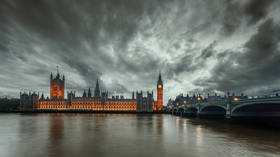Most Brits regret Brexit – poll
Just one in ten respondents to a survey conducted three years after the UK left the EU said they were better off financially
Most UK residents now believe Brexit has been bad for the economy, according to an Opinium poll conducted to mark the third anniversary of the country’s departure from the EU and published on Saturday.
A slight majority (54%) of survey respondents found Brexit had negatively impacted the UK economy as a whole, while a dismal 13% thought its outcome had been good.
A similar percentage (53%) thought Brexit had hurt the UK’s ability to control immigration, while even more (57%) saw an undesirable effect on their country’s ability to import European goods. Nearly two in three respondents (63%) believed leaving the EU was contributing to inflation and the cost-of-living crisis, compared to just 8% who thought they were getting a better deal in the shops post-Brexit.
More than a third (35%) of those polled believed exiting the bloc had negatively impacted their own financial situation, with just one in ten reporting it had helped them financially.
The effect on salaries and wages was viewed unfavorably by 40%, with just 11% saying they saw a benefit, while nearly half (47%) saw an unfavorable impact on the National Health Service, compared to just 9% who thought things had improved.
“Public discontent at how Brexit has been handled by the government continues, with perceived failings even in areas previously seen as a potential benefit from leaving the EU,” Opinium head of policy and public affairs James Crouch told The Guardian. However, he said, “Brexit is likely to be a secondary issue at the next election compared to the state of the economy and the NHS, which are the clear priority for voters.”
While the UK voted to leave the EU in 2016 by a four-point margin, with 52% in favor of the move, it did not actually exit until January 2020 – two months before the government’s decision to shut down the economy and lock down the population in response to the Covid-19 pandemic plunged the country into its worst recession since record-keeping by the Office for National Statistics began in 1955.
After a failed attempt at a Brexit deal led to then-Prime Minister Theresa May’s resignation in 2019, the separation was finally achieved under the direction of her successor Boris Johnson, who led his Conservative party to victory in their biggest election win since the Thatcher years based on his promise to “Get Brexit Done.”
Current PM Rishi Sunak, who served as chancellor under Johnson, also touted the economic benefits of leaving the EU, calling it a “once-in-a-generation opportunity for our country to take back control of its destiny.”
You can share this story on social media:








Comments are closed.